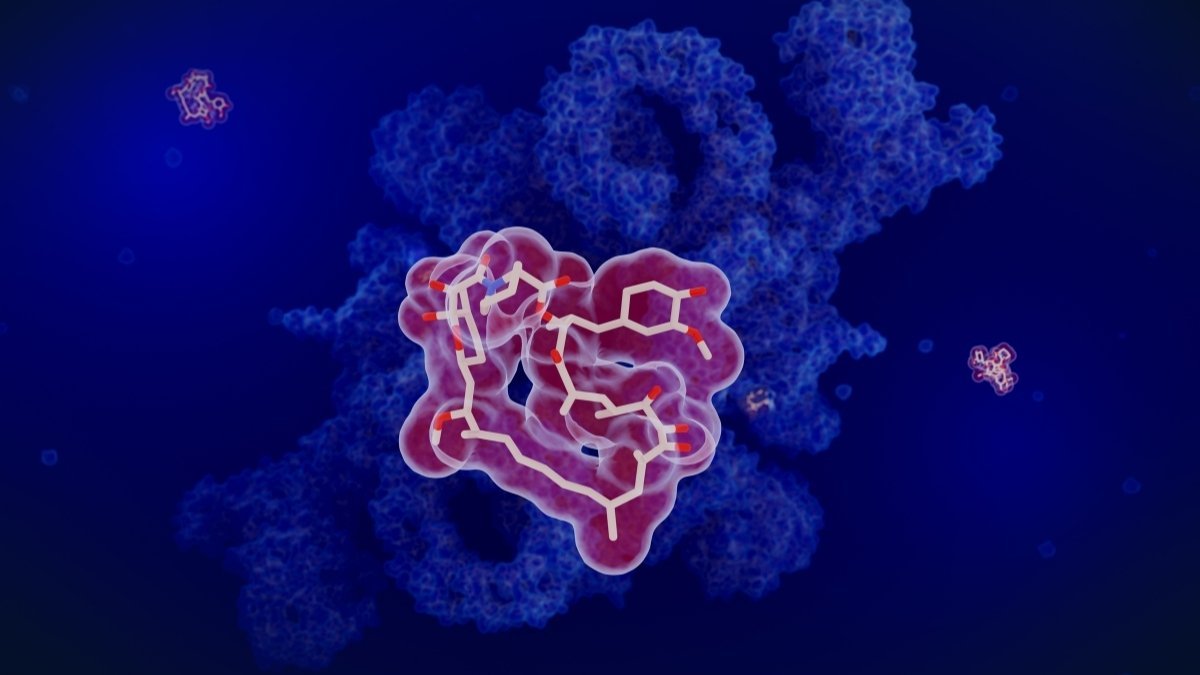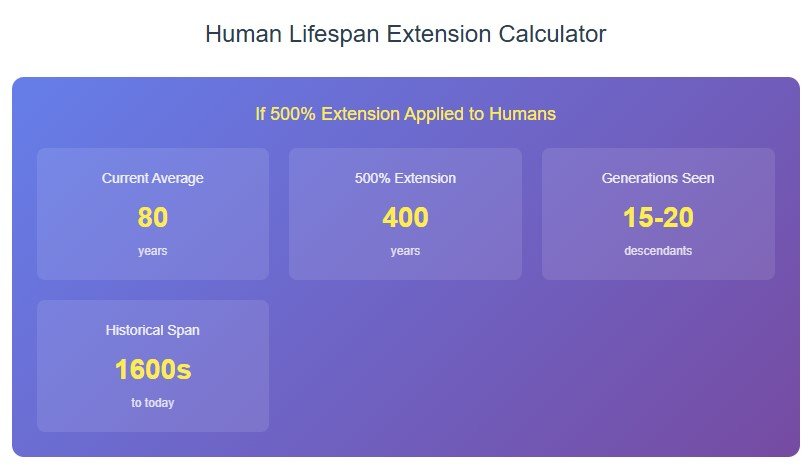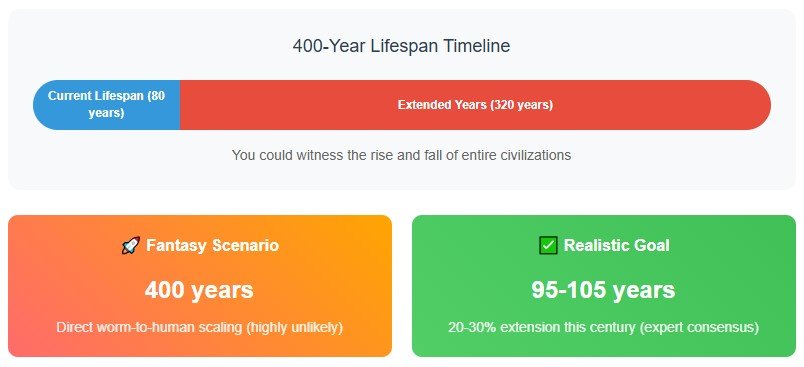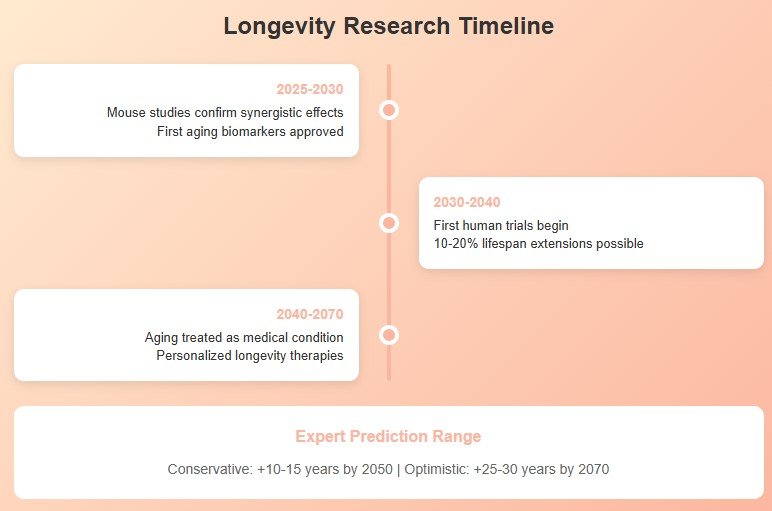
What if I told you that researchers just figured out how to make living creatures live five times longer than normal? Not 5% longer. Not 50% longer. But 500% longer.
You’d probably think I was talking about some far-off science fiction fantasy. But here’s the thing – it actually happened. In a real lab. With real results that have the entire aging research community buzzing.
And the best part? The scientists didn’t use some mysterious new technology or expensive experimental procedure. They simply combined two biological pathways that we’ve known about for years.
Let me break this down for you in a way that’ll make you rethink everything you thought you knew about aging.
The Mind-Blowing Discovery That’s Got Everyone Talking
Timeline of Aging Research Breakthroughs
You’re a tiny worm living in a lab dish. Normally, you’d live about 20 days – that’s your entire lifespan from birth to death.
But what if someone told you that with a simple genetic tweak, you could live for 100 days instead?
That’s exactly what happened at the MDI Biological Laboratory in Maine. And when I say it shocked the scientific community, I mean it really shocked them.
Here’s why this is such a big deal:
- Individual pathway changes typically extend worm lifespan by maybe 30-100%
- Mathematical predictions suggested that combining the two pathways would add up to about 130% extension
- What actually happened? A mind-blowing 500% increase
It’s like expecting to add $100 + $30 and getting $500 instead. The math just doesn’t work – unless something incredible is happening behind the scenes.
Meet the Biological Pathways That Control How Long You Live
Before we dive deeper, let’s talk about what these researchers actually did. They targeted two specific biological pathways that exist in pretty much every living creature on Earth – including you.
The Insulin Pathway: Your Body’s Growth Controller

Think of the insulin pathway as your body’s growth manager. When it’s active, it’s basically saying: “Hey, we’ve got plenty of food and resources. Time to grow, reproduce, and live fast!”
But here’s the fascinating part – when you dial this pathway down, your body switches into survival mode. Instead of focusing on growth, it starts focusing on maintenance and repair.
It’s like switching your car from “performance mode” to “economy mode.” You might not go as fast, but you’ll last a lot longer.
The TOR Pathway: Your Cellular Quality Control System

The second pathway (called TOR, which stands for Target of Rapamycin) is like your body’s quality control manager. It decides when cells should make new proteins and when they should clean house.
When TOR activity is high, your cells are in building mode. When it’s low, they switch to cleaning and maintenance mode – kind of like how you might clean your house instead of buying new furniture when money’s tight.
Here’s Where It Gets Really Interesting

The researchers expected that tweaking both pathways would give them a nice, predictable result. After all, if pathway A extends life by 100% and pathway B extends it by 30%, logic says you should get about 130% total extension, right?
Wrong.
What they got was something that defied all expectations. The two pathways didn’t just add together – they created what scientists call “wild synergy.”
Think about it like this: Have you ever noticed how certain combinations just work better together than they should? Like how peanut butter and chocolate create something way more delicious than either ingredient alone?
That’s exactly what happened here, but with biology instead of food.
What This Could Mean for Humans (And Why You Should Care)

Now, I know what you’re thinking: “That’s great for worms, but what about me?”
Here’s the thing – these pathways aren’t unique to worms. They exist in mice, monkeys, and yes, humans, too. We’ve had them for millions of years of evolution.

Let’s do some quick math to put this in perspective:
- Average human lifespan today: About 80 years
- A 500% extension would mean: Living to 400 years old
- That’s like: Being born when Shakespeare was writing his plays and still being alive today
But before you start planning your 300th birthday party, we need to talk about reality.
The Reality Check: Why 400-Year-Old Humans Aren’t Happening Tomorrow

I hate to burst your bubble, but we’re not going to see 400-year-old humans anytime soon. Here’s why:
Worms vs. Humans: It’s Complicated
Worms are incredibly simple creatures:
- 959 cells total (humans have 37 trillion)
- No heart, lungs, or complex organs
- 3-week lifespan (vs. our decades)
Scaling up from worm biology to human biology is like trying to upgrade from a bicycle to a spaceship. The complexity difference is enormous.
What’s More Realistic?
Most aging researchers think we might be able to add 20-30% to human lifespan this century. That would mean:
- Instead of living to 80: Living to 95-105
- Extra healthy years: 15-25 additional quality years
- Impact: You could see your great-great-grandchildren grow up
That might not sound as sexy as living to 400, but imagine having an extra 20 healthy years to spend with family, pursue passions, or contribute to the world.
The Scientists Behind This Breakthrough

This wasn’t some random discovery by unknown researchers. The team behind this study includes some serious heavy-hitters in aging research:
Aric Rogers from MDI Biological Laboratory has spent years figuring out how to control aging at the molecular level. Think of him as a biological engineer who’s learned to hack the aging process.
Pankaj Kapahi from the Buck Institute is basically aging research royalty – he has over 17,000 citations and is considered one of the world’s top experts on how nutrition and metabolism affect aging.
The fact that established institutions like these are behind the research gives it serious credibility. These aren’t fringe scientists making wild claims – they’re respected researchers with decades of experience.
How This Compares to Other “Fountain of Youth” Claims

You’ve probably seen headlines about anti-aging breakthroughs before. Most of them turn out to be overhyped or completely wrong.
So how does this study stack up?
The Good News:
- Published in Cell Reports – a prestigious, peer-reviewed journal
- Collaboration between multiple institutions – not just one lab making claims
- Built on decades of established research – not coming out of nowhere
- Dramatic, measurable results – not just marginal improvements
The Reality Check:
- Only tested in worms so far – no guarantee it works in humans
- Needs independent replication – other labs need to confirm the results
- Long path to human trials – we’re talking decades, not years
What’s Happening Right Now in Anti-Aging Research
The Longevity Investment Boom
Major Players & Their Focus
While we wait for worm discoveries to translate to humans, the aging research field is absolutely exploding. Here’s what’s happening:
The Money Is Pouring In
- $3+ billion invested in 2023 in longevity biotech companies
- Jeff Bezos funded $3 billion for Altos Labs alone
- Over 700 companies are working on aging interventions
Real Human Trials Are Starting

The TAME trial is testing whether metformin (a diabetes drug) can slow aging in 3,000 people. It’s the first FDA-approved trial that treats aging itself as a medical condition.
Existing Drugs Show Promise
Some medications already on the market might have anti-aging effects:
- Metformin (diabetes drug)
- Rapamycin (immunosuppressive drug)
- SGLT2 inhibitors (diabetes drugs)
The Bigger Picture: Why This Research Matters So Much

Here’s something that might surprise you: aging isn’t just about getting older. It’s the single biggest risk factor for almost every major disease.
Think about it:
- Heart disease, cancer, diabetes, Alzheimer’s – they all become much more common as we age
- If we could slow aging by 20%, we might prevent millions of cases of these diseases
- The economic impact could save trillions in healthcare costs
This isn’t just about living longer – it’s about living healthier for more of your life.
What You Can Do Right Now
Evidence-Based Longevity Strategies
Longevity Score Calculator
While we wait for breakthrough anti-aging therapies, you’re not powerless. Research has identified several things that can help you age better:
The Basics That Actually Work:
- Regular exercise – especially strength training
- Healthy diet – Mediterranean-style diets show the best evidence
- Quality sleep – 7-9 hours consistently
- Stress management – chronic stress accelerates aging
- Social connections – loneliness literally shortens lifespan
Promising Supplements:
While most supplements are overhyped, a few show real promise:
- Nicotinamide riboside (NR) – may boost cellular energy
- Resveratrol – mixed results, but some promising data
- Metformin – some people take it off-label for longevity
The Timeline: When Might We See Real Results?

I know you want dates, so here’s what experts are predicting:
Next 5-10 Years:
- More animal studies confirming (or disproving) the 500% extension
- First-generation human anti-aging drugs are reaching the market
- Better biomarkers to measure aging
10-20 Years:
- Meaningful human lifespan extensions (maybe 10-20%)
- Aging is treated as a medical condition
- Personalized anti-aging therapies
20+ Years:
- Potentially dramatic lifespan extensions
- Integration of multiple anti-aging approaches
- Society adapting to longer human lifespans
The Bottom Line: Hope vs. Hype
Here’s my take after diving deep into this research: the 500% lifespan extension in worms is genuinely exciting and scientifically significant. It shows us that aging is far more controllable than we ever imagined.
But we need to be realistic about timelines and expectations.
What this research proves:
- Aging pathways can interact in unexpected ways
- Dramatic lifespan extensions are biologically possible
- We’re on the right track with current aging research
What it doesn’t prove:
- That humans will live to 400 anytime soon
- That the same results will work in complex organisms
- That it’s safe or practical for human use
Your Next Steps
If this article got you excited about aging research (and I hope it did), here’s what you can do:
- Stay informed – follow reputable sources like the Buck Institute or NIH National Institute on Aging
- Take care of yourself now – the basics still matter most
- Support aging research – consider donating to organizations funding this work
- Stay skeptical – be wary of companies selling “anti-aging” products based on early research
The future of aging research is genuinely exciting. We might be living through the early days of a revolution in how we think about growing old.
And who knows? Maybe someday you’ll thank these worm researchers for giving you an extra 20 healthy years with your family.
What do you think? Are you excited about the possibility of dramatically extended lifespans, or does the idea worry you? Let me know in the comments below.






